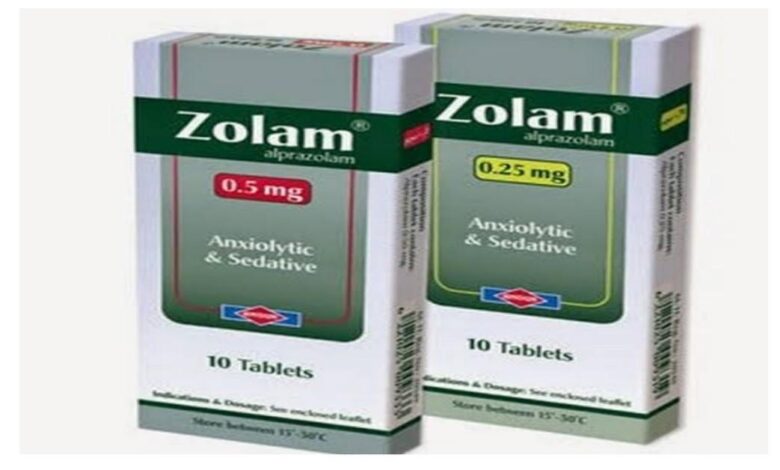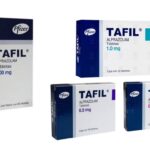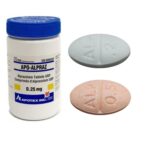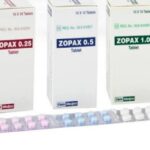Zolam: Uses, Dosage, Side Effects, Addiction, Price

Zolam is a brand of alprazolam in Egypt and many other Arab countries. Zolam is used for the short-term relief of symptoms of anxiety or anxiety linked with depression. It is classified as a Schedule IV controlled substance. Zolam works by attaching to a receptor in your brain called the GABA-A (gamma-aminobutyric acid-A) receptor. When Alprazolam binds to this receptor, it has a calming effect on the brain.
For anxiety disorders, Alprazolam is often prescribed because it can help relieve anxiety symptoms quickly. However, other anxiety medications and talk therapy are better long-term choices for treating anxiety because Alprazolam has side effects, risk of overdose, and the potential for dependence.
These other treatments may take a few weeks to take effect though. So Alprazolam and other benzodiazepines are sometimes used as a “bridge” until other treatments can have a chance to work. For treating insomnia and behavioral therapy, other medications are generally preferred over Alprazolam.
What form(s) does Zolam come in?
Zolam comes as a tablet, an extended-release tablet, an orally disintegrating tablet (a tablet that dissolves quickly in the mouth). The 5 variants of Zolam includes:
- Zolam 0.25 mg tablet which contains 250 mcg alprazolam.
- Zolam 0.5 mg tablet which contains 500 mcg alprazolam.
- Zolam 1.0 mg tablet which contains 1 mg alprazolam.
- Zolam 2.0 mg tablet which contains 2 mg alprazolam.
- Zolam XR controlled-release tablets
Is Zolam safe?
Genuine Zolam pill is safe to use especially those obtained with a prescription from a registered Pharmacy. Med safety does not recommend buying Zolam pills or any other brand of alprazolam from online pharmacies as they could be laced with fentanyl which can result in overdose and instant death. In the 12-month period, more than 100,000 Americans died of overdoses, up almost 30 percent from the 78,000 deaths in the prior year, according to provisional figures from the National Center for Health Statistics.
How is Zolam taken?
A person should take Zolam by mouth as a doctor directs. The dosage will be based on the following factors:
• why the person is taking it
• their age
• how their body responds to the treatment
The recommended dose of Zolam for adults also varies depending on its use. The starting dose for excessive anxiety is 0.25 mg taken 2 or 3 times a day. This is gradually increased until anxiety is controlled and side effects are minimized. Elderly patients may be started at a lower dose of 0.125 mg taken 2 or 3 times a day. The usual maximum dose is 3 mg daily.
The starting dose for panic attacks is 0.5 mg to 1 mg at bedtime or 0.5 mg taken 3 times daily. The dose is then gradually increased until there are no more panic attacks.
A doctor may gradually increase the dosage of Zolam until the drug works effectively for the person. People should closely follow their doctor’s instructions to reduce the risk of side effects.
If a person has used this medication regularly for a long time or in high dosages, withdrawal symptoms can occur if they suddenly stop taking it. To prevent this, a doctor may reduce the dosage of Zolam gradually.
What happens if I miss a dose of Zolam?
If a person misses a dose of Zolam, they should take the missed dose as soon as they remember. However, they should skip the missed dose if it is almost time for their next scheduled dose. They should not take extra to make up for the missed dose.
What happens if I overdose on Zolam?
Symptoms of a Zolam overdose include:
• tiredness
• confusion
• impaired coordination
• diminished reflexes
• coma
Death has occurred in association with overdoses of Zolam by itself, as it has with other benzodiazepines.
If an overdose of Zolam occurs, a person needs emergency medical attention. Somebody should call 911 or Poison Control at 800-222-1222.
What are the possible side effects of Zolam?
Zolam may cause serious side effects including:
• depressed mood,
• thoughts of suicide or hurting yourself,
• racing thoughts,
• increased energy,
• unusual risk-taking behavior,
• confusion,
• agitation,
• hostility,
• hallucinations,
• uncontrolled muscle movements,
• tremor,
• convulsions (seizure), and
• pounding heartbeats or fluttering in your chest
Get medical help right away, if you have any of the symptoms listed above.
The most common side effects of Zolam include:
• drowsiness,
• feeling tired,
• slurred speech,
• lack of balance or coordination,
• memory problems, and
• feeling anxious early in the morning
Tell the doctor if you have any side effect that bothers you or that does not go away.
These are not all the possible side effects of Zolam. For more information, ask your doctor or pharmacist.
Call your doctor for medical advice about side effects. You may report side effects to FDA at 1-800-FDA-1088
What medications may interact with Zolam?
If your doctor has directed you to use Zolam, your doctor or pharmacist may already be aware of any possible drug interactions, health risks, and side effects, and may be monitoring you for them. Do not start, stop, or change the dosage of this drug or any medicine before checking with your doctor, health care provider, or pharmacist first.
Severe Interactions of Zolam include:
• itraconazole
• ketoconazole
• sodium oxybate
• tipranavir
Serious Interactions of Zolam include:
• carbamazepine
• cimetidine
• clarithromycin
• erythromycin base
• erythromycin ethylsuccinate
• erythromycin lactobionate
• erythromycin stearate
• idelalisib
• itraconazole
• ivacaftor
• ketoconazole
• nefazodone
• rifabutin
• rifampin
• saquinavir
• valerian
Zolam has moderate interactions with at least 264 different drugs.
Minor interactions of Zolam include:
• brimonidine
• ciprofloxacin
• esomeprazole
• eucalyptus
• fleroxacin
• gemifloxacin
• green tea
• levofloxacin
• lithium
• moxifloxacin
• norfloxacin
• ofloxacin
• omeprazole
• rifabutin
• sage
• vinpocetine
• zolpidem
This document does not contain all possible interactions of this drug with other drugs. Therefore, before using this medication, tell your doctor or pharmacist of all the medications you use. Keep a list of all your medications with you, and share the list of drugs with your doctor and pharmacist. Check with your doctor if you have health questions or concerns.
Frequently Asked Questions about Zolam
Q: How long does it take to feel the effects of Zolam?
Zolam is taken by mouth and is readily absorbed into the bloodstream. You should start feeling the effects of Zolam in under an hour. The medication reaches peak concentrations in the bloodstream in one to two hours following ingestion.
People who take Zolam will often build up a tolerance. For these people, it may take longer to feel the sedative effects of Zolam or the sedation may not feel as strong.
Q: How long does it take for the effects of Zolam to wear off?
One way to find out how long a drug will last in the body is to measure its half-life. The half-life is the time it takes for half of the drug to be eliminated from the body.
Zolam has an average half-life of roughly 11 hours in healthy adults. In other words, it takes 11 hours for the average healthy person to eliminate half of the dose of Zolam. However, it’s important to note that everyone metabolizes medications differently, so the half-life will vary from person to person. Studies have shown that the half-life of Zolam ranges from 6.3 to 26.9 hours, depending on the person.
It takes several half-lives to fully eliminate a drug. For most people, Zolam will fully clear their body within two to four days. But you will stop “feeling” the sedative effects of Zolam before the drug has actually fully cleared your body. This is why you may be prescribed Zolam up to three times per day.
Q: How long does Zolam stay in your system?
Studies have shown that the half-life of Zolam ranges from 6.3 to 26.9 hours. It is important to realize that half-life is a figure that is an estimate of the time it takes for the concentration or amount in the body of that drug to be reduced by exactly one-half (50%). After four to five half-lives, 97% of a drug has cleared from the body, and the drug is no longer considered to be having any effect. However, this does not mean that it won’t be detectable by a drug test, as this depends on how specific and sensitive the drug test is.
If we use the average half-life of Zolam, which is 11.2 hours, then the following is estimated for a 1mg dose of Zolam:
- 11.2 hours after administration, 0.5mg remains
- 22.4 hours minutes after administration, 0.25mg remains
- 33.6 hours after administration, 0.125mg remains
- 44.8 hours after administration, 0.063mg remains
- 56 hours after administration, 0.0315mg remains.
In theory, we can see that after 56 hours (2.3 days), almost all the original Zolam dose (slightly less than 97%) has been eliminated in people whose Zolam half-life is 11.2 hours. However, in some people, the half-life of Zolam is 26.9 hours. In these people, it will take approximately 134.5 hours (5.6 days) for almost 97% of a dose of Zolam to be eliminated.
Q: What does Zolam withdrawal feel like?
Zolam has a high potential to be a habit-forming drug. Symptoms of withdrawal typically begin two to seven days after your last dose. They can last two to eight weeks.
If you take Zolam, don’t stop it without talking to your doctor first. Some withdrawal symptoms can be dangerous. You need to follow a program with your doctor’s supervision to taper off the high doses and ultimately quit entirely.
Symptoms of withdrawal include:
• sleep problems and insomnia
• restlessness
• nervousness
• aggression
• poor concentration
• suicidal thoughts
• worsened anxiety or panic attacks
• depression
• seizures
Your doctor can administer medication to help ease these symptoms and prevent further complications.
Can you drink alcohol while taking Zolam?
Taking Zolam with alcohol will intensify the side effects of both substances. Researchers don’t know exactly why this happens. It likely has to do with the chemical interactions between Zolam and alcohol in the body.
A 2018 animal study suggests the presence of ethanol, the main ingredient in alcoholic drinks, can increase the maximum concentration of alprazolam in the bloodstream.
In turn, this can cause both an enhanced high or “buzz” as well as enhanced side effects. The liver also needs to work harder, since it breaks down both alcohol and Zolam in the body.
Zolam vs Xanax which is stronger?
Zolam and Xanax both contain the same active ingredient (alprazolam) as a result, Zolam XR side effects are the same as Xanax XR side effects while Zolam 2mg is equivalent to Xanax 2mg, none is stronger than the other at the same dose.
What is the price of Zolam?
Zolam is cheaper than Xanax and can be purchased in retail pharmacies. The average price of Zolam with a prescription is $3.6 per tablet or $110 for a supply of 30 tablets, depending on the pharmacy you visit. Prices are for cash-paying customers only and are not valid with insurance plans.
Addiction To Zolam (Alprazolam)
Zolam is a powerful Benzodiazepine, it is extremely addictive when used long-term, making Zolam addiction and abuse a serious concern. Alprazolam is the number one prescribed psychiatric medication in the United States. 70% of teens with a Zolam addiction get the drug from their family’s medicine cabinet.
Tolerance to Zolam develops quickly, requiring the user to take more of the drug to achieve the desired effects. Someone with a Zolam addiction may take up to 20 or 30 pills per day. If the user decides to stop taking Zolam, they may experience withdrawal effects such as anxiety, restlessness, insomnia, and tremors. The onset of withdrawal symptoms is a sign that a physical dependence has developed. The development of tolerance and withdrawal are indications of addiction.
Once a Zolam addiction has taken hold, daily responsibilities such as school, work, or family are ignored as energy is redirected toward drug-seeking behavior.
Other behavioral signs of Zolam addiction include:
- Continued use of Zolam even though it is contributing to personal difficulties.
- Inability to stop using Zolam despite the desire to.
- Loss of interest in activities once enjoyed.
- Obsessing about obtaining and using Zolam.
- Loss of control over the amount of Zolam being consumed.
- Legal problems that are the result of using Zolam.
- Risk-taking behaviors, such as driving while under the influence of Zolam.
If a user wishes to stop taking Zolam after dependence on the drug has formed, it is not recommended to quit “cold turkey” or without medical supervision. The symptoms of Zolam withdrawal are similar to those of alcohol or Barbiturate withdrawal, and the severity of the symptoms can vary. If convulsions occur, withdrawal from Zolam can be deadly.
Normally, the withdrawal process involves slowly reducing the dosage of Zolam and eventually switching the user to a long-acting form of the drug for a period of time. The gradual taper of this drug helps to reduce withdrawal symptoms.





